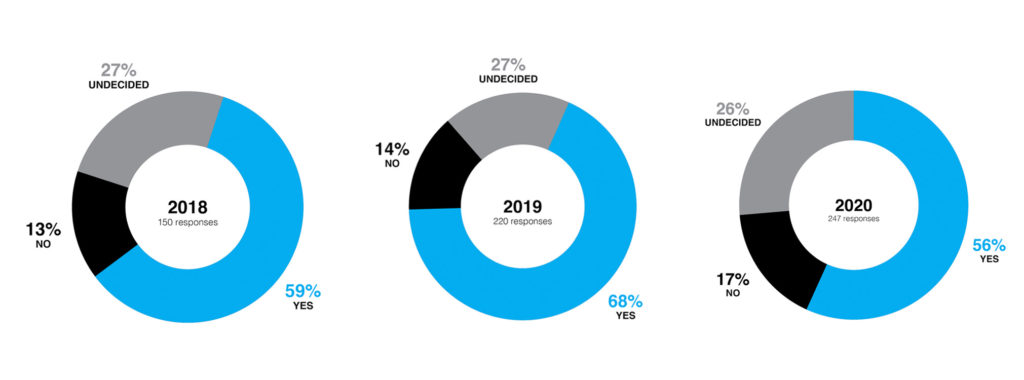By Emily Kestel
It’s estimated that more than 80% of women and 40% of men have been sexually harassed in their lifetimes. But until five years ago, sexual harassment and assault weren’t talked about widely in the public sphere.
In October 2017, actress Alyssa Milano tweeted, “If you’ve been sexually harassed or assaulted, write ‘me too’ as a reply to this tweet,” after reporting by the New York Times and the New Yorker revealed sexual assault allegations against Hollywood executive Harvey Weinstein. It is also worth noting that the phrase “me too” and the #MeToo movement were first coined by activist Tarana Burke in 2006 as a way for Black women and girls to share experiences of sexual trauma.
Milano’s tweet and the #MeToo movement became a vehicle for people to share their stories about sexual harassment and misconduct they experienced in and outside of the workplace.
At the five-year anniversary mark, has the #MeToo movement done anything to curtail sexual misconduct and harassment in the workplace?
“The world is forever changed because of #MeToo,” Burke wrote in a column for Time magazine. “The language we use is shifting, replacing words like victim with survivor. We talk about mental health and healing, and employers are crafting thoughtful human-resource policies, not just reacting after a workplace harassment crisis. Consumers are more conscientious about the cultural content they consume and vocal about calling out rape culture when they see it.”
In another piece in Fortune, Burke said, “It’s not so much about what has been done, but more so what #MeToo made possible. … I’ve had a lot of disappointment over the last five years, don’t get me wrong. … But a path has been cleared because #MeToo went viral. I don’t have to take as long to explain why this work is important. I don’t have to beg people to make space to have this conversation. There was a time when I had to literally beg people to get this issue on an agenda. Now people want me on the agenda.”
Iowa author and advocate Kirsten Anderson believes that #MeToo has empowered others to talk about what’s happened to them.
“It’s shown that people aren’t as alone as they may have thought they were. That’s really positive. It’s also shown that we have a long way to go in that. Now we need to start turning those conversations into actions,” Anderson said.
She said now is the time for employers to advocate for safe, inclusive work environments.
“Post-pandemic, we’ve seen our workplaces change dramatically,” Anderson said. “We’re advocating for our own best workplaces. [Harassment and microaggressions] should be part of the conversation.”
As far as concrete, measurable actions taken as a response to the #MeToo movement, here are some examples.
- This year, President Joe Biden signed into a law a bill that ends forced arbitration for workers who are victims of sexual assault and harassment. The bill prohibits employers from requiring employees to settle sexual misconduct allegations through closed-door arbitrations that are believed to often favor the alleged perpetrators. Employees instead can sue in court with their own legal representation.
- Between 2017 and 2021, state legislatures introduced 2,324 #MeToo-related bills. They passed 286. Many of the bills have addressed nondisclosure agreements, anti-harassment training, forced arbitration and workplace harassment protections for independent contractors.
- Many famous men have been fired, forced to resign, imprisoned or “canceled.” These men include Weinstein, TV anchor Matt Lauer, politician Al Franken, actor Bill Cosby, chef Mario Batali, radio personality Garrison Keillor and media mogul Roger Ailes. Other men, like actor James Franco and comedian Louis C.K., have seen their careers rebound.
- In fiscal year 2018, the Equal Employment Opportunity Commission received 7,609 sexual harassment cases, compared with 6,696 in fiscal year 2017 – an increase of more than 13%.
- In 2018, Iowa Gov. Kim Reynolds signed a proclamation declaring October as Change the Culture month in the state. According to the National Women’s Law Center, Iowa has not passed or signed into law any legislation that advances workplace anti-sexual harassment reforms since 2017.
The question of whether or not Americans believe the #MeToo movement has changed the climate around workplace misconduct, though, produces mixed results.
Data from the Pew Research Center found that 70% of Americans believe that those who commit sexual harassment or assault in the workplace are more likely to be held responsible than they would have been five years ago. The poll also found that 46% of Americans say the #MeToo movement has made it harder for men to know how to interact with women in the workplace.
In previous Fearless and Lift IOWA surveys, the Business Record has asked readers about the #MeToo movement. The questions we asked varied slightly year to year, and we did not survey readers about #MeToo in 2021.
In both 2018 and 2022, a majority of respondents – 63% and 62%, respectively – said they believed that #MeToo and other publicized movements, like the Women’s March, had resulted in a positive change for gender equality.
In 2022, we asked, “Do you believe significant progress has been made in addressing sexual assault and harassment throughout all sectors and levels of employment?” Forty-six percent of respondents said yes, and 54% said no.
In surveys in 2018, 2019 and 2020, we also asked, “Do you feel the #MeToo movement has been helpful to professional and working women?” A majority of respondents said yes all three years.

Here are some responses from this year’s Fearless survey, where we asked about progress and changes the #MeToo movement has had for gender equality:
- “I see much less discussion of ‘he said, she said’ now. Now it’s more about prevention and early reporting. Belief seems to be less of a question than in the past.”
- “Significant progress has been made in the number of conversations being had and stories coming to light, I don’t believe much is being done to truly address the issue.”
- “I think men are significantly more cautious, however, I also think many men joke about the movement like it’s simply an inconvenience to their daily behavior. So yes, I think it has changed many work environments, but no, I don’t think many men ‘get it’ yet.”
- “It’s allowed for more awareness and exposure of the issue, but has also caused many men to retreat and go backwards, not wanting to do or say anything toward gender equity due to fear of making a mistake.”
- “I think we over-corrected, and cancel culture has run rampant.”
- “I wish there was more conversation about why the movement is important and not simply what is and is not appropriate at work. I think if men better understand the psychological damage associated with workplace sexual harassment, they might be more inclined to care rather than just modify behavior to avoid issues.”
For more information about the #MeToo movement, check out the following resources:
- Listen to the “Unsettled: Mapping #MeToo” podcast series by Iowa Public Radio.
- Read a conversation with Kirsten Anderson, author of “More Than Words: Turning #MeToo Into #ISaidSomething.”
- Read a column by Business Record Editor Emily Barske on how #MeToo affected male allyship at work.
- Visit the Me Too website to access a resource library and learn more about the movement.

